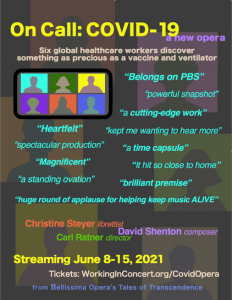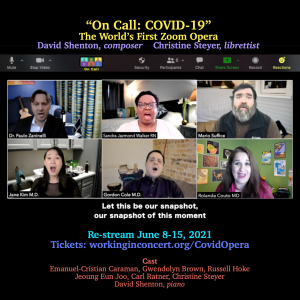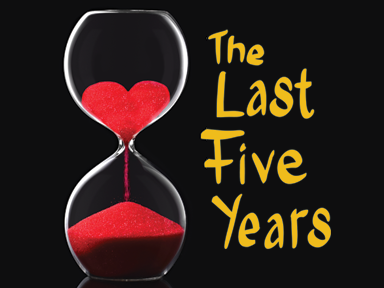
 Recommended *** “When the great plague wiped out half of the country 400 years ago, what did [the Italians] do?…. We sang!” This quotation from “On Call: COVID-19 Opera” best sums up the performance. Librettist Christine Steyer, of Oak Park, Illinois, and director Carl Ratner have created an opera that is tough to watch but important, as it plunges the online audience into the thick of the coronavirus crisis—and what it means to be a health and hospital worker during these trying times. This production is by no means a relief from the news but an enhancement of it from the first-person perspective of six essential workers from around the world, located in Chicago; New York; Rio de Janiero Brazil; Bergamo, Italy; the Beqaa Valley, Lebanon; and Seoul, South Korea. We see these people as heroes and selfless colleagues, who have made a sincere commitment to help others overcome this dreadful disease, and we follow them through three scenes: early April 2020, early September 2020, and New Year’s Eve 2021. We watch the tremendous amount of pain that the six undergo, as the pandemic has affected their working lives and their personal lives. When the overwrought health professionals try to cope with the reality or make sense of it or internalize it as part of their own life story, the audience cannot help but empathize.
Recommended *** “When the great plague wiped out half of the country 400 years ago, what did [the Italians] do?…. We sang!” This quotation from “On Call: COVID-19 Opera” best sums up the performance. Librettist Christine Steyer, of Oak Park, Illinois, and director Carl Ratner have created an opera that is tough to watch but important, as it plunges the online audience into the thick of the coronavirus crisis—and what it means to be a health and hospital worker during these trying times. This production is by no means a relief from the news but an enhancement of it from the first-person perspective of six essential workers from around the world, located in Chicago; New York; Rio de Janiero Brazil; Bergamo, Italy; the Beqaa Valley, Lebanon; and Seoul, South Korea. We see these people as heroes and selfless colleagues, who have made a sincere commitment to help others overcome this dreadful disease, and we follow them through three scenes: early April 2020, early September 2020, and New Year’s Eve 2021. We watch the tremendous amount of pain that the six undergo, as the pandemic has affected their working lives and their personal lives. When the overwrought health professionals try to cope with the reality or make sense of it or internalize it as part of their own life story, the audience cannot help but empathize.
There is the sense in the first scene that COVID will be over sometime in the future. As a tribute to human resilience, the watchword will be “Risorgeremo!” “We will rise again!” Scene two, however, is more pessimistic: “Just when things couldn’t get worse”, COVID has made death and dying become normalized. At the same time, the supply chain has become fractured and global recession has taken hold, not to mention horrifying world events still exist: not limited to climate change, war, and violence. As we listen to soloists hitting all sorts of dissonant notes as they sing about their tragedies, we begin to wonder how tragic must tragic be. The discordance is not only in the music but also in the layering of world views that no longer seem to make sense together. So while we see a glimmer of hope in the third scene, this is rather transitory, and the political side of this opera emerges. How can we respect our elders or our ancestors anymore, since they have gotten us into this terrible mess in the first place?
Produced and commissioned by Working in Concert’s Bellissima Opera, this video on YouTube is billed as the premiere of the world’s virtual opera. The Bellissima Opera is made up of: Emanuel-Cristian Caraman, tenor; Gwendolyn Brown, contralto; Russell Hoke, baritone; Jeong Eun Joo, soprano; Carl Ratner, baritone; and Christine Steyer, soprano. The operatic voices are all excellent, forceful, and elegant, with the most amazing among them being that of Caraman. The best part of the performance is how well all six harmonize with each other. This was not an easy feat for director Ratner to accomplish, considering that the singers had to be brought together virtually on Zoom from the isolation of their homes in various parts of the United States. Composer, music director, pianist, and violinist David Shenton has done a tremendous job pulling all of these diverse voices together with his original music and instrumental accompaniment; he also served as the audio engineer. The performance was also bolstered by a thirty-person International Choir, plus the WMU University Chorale, conducted by Kimberly Dunn Adams.
There are moments when the lyrics (most of which are in English, all with English subtitles) describe situations that are so horrible and egregious that we, in the audience, become melancholic. “Around us people fall like snow” is a line from the text. The libretto is certainly fodder for the mind, but it immediately dates itself as a period piece, which the producers call a snapshot of our times. The larger question beyond the agonizing and grief is where does this show take us? What do we do now? I am not asking these questions cynically or rhetorically. The last twenty minutes discusses how science has been subjugated to politics and religion, and this reality has made the pandemic worse than it needed to have been. It makes these devoted doctors and nurses livid that so many people’s lives have been put in danger unnecessarily and unconscionably—with death too often being the result.
Working in Concert has brought “On Call: COVID-19 Opera” to its virtual audience via its website: https://workinginconcert.org/covidopera/. This is a limited return engagement, available as video-on-demand, through June 15, 2021.
This 60-minute opera (plus the introduction) is dedicated to “all the healthcare workers risking their lives to assist others during the COVID-19 pandemic and to the journalists who honor their stories by sharing them with the world.”
Tickets range from $20-30, with $5 student tickets. Discounts and group rates are available. For ticketing information, please go to: https://workinginconcert.org/covidopera/.
To see what others are saying, visit www.theatreinchicago.com, go to Review Round-Up and click at “On Call: Covid-19 Opera”






More Stories
“The Firebugs” reviewed by Julia W. Rath
“The Book of Grace” Al Bresloff with another from Paul LIsnek
“The Last Five Years” MILWAUKEE